In National Survey, Americans Say Chinese People Are Blameless for Coronavirus Spread, but Their Government May Owe Us
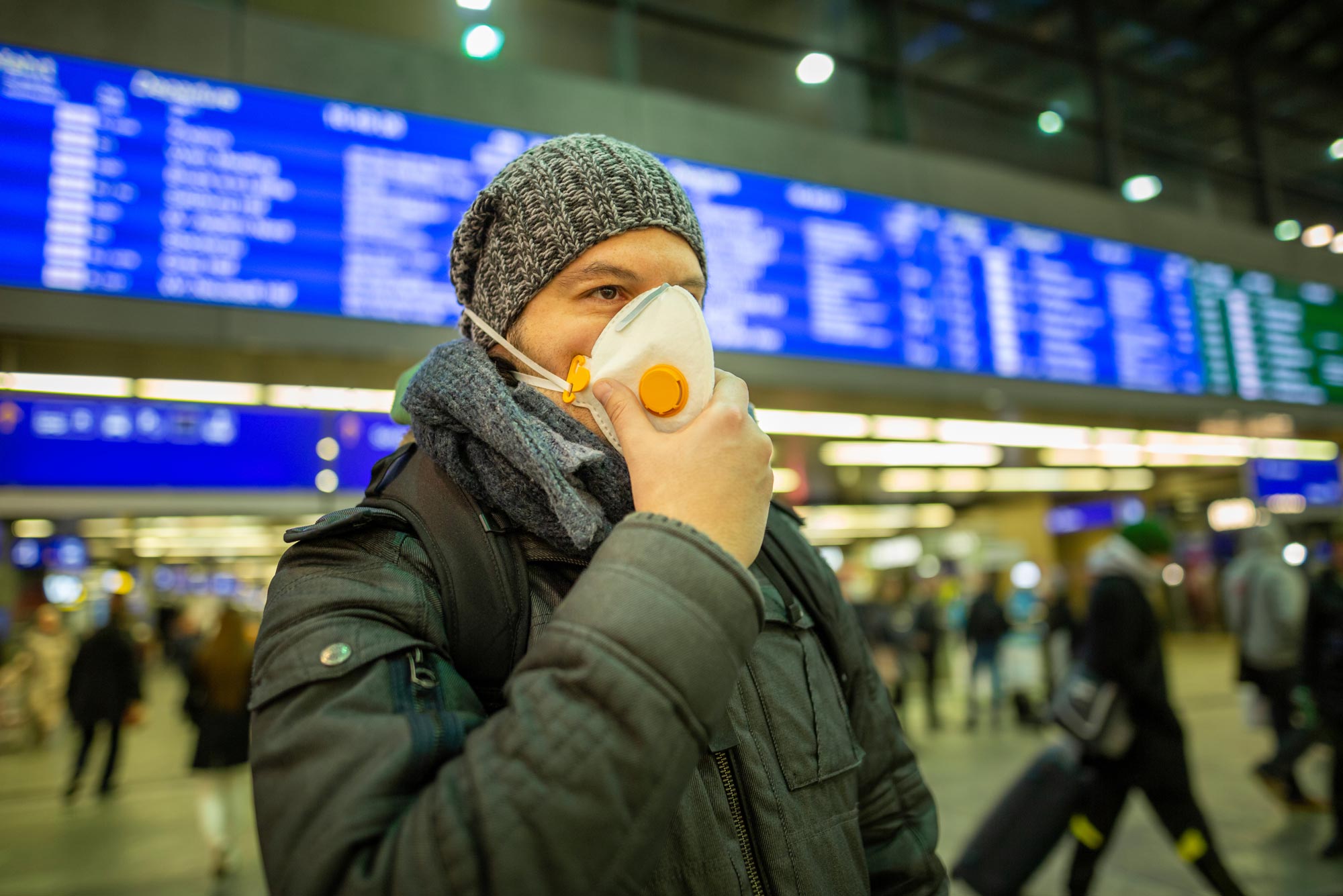
The survey of 2,049 respondents—interviewed between April 24, 2020, and May 7, 2020—also suggests there is continuing broad support for measures, like reduced travel, urged by many governors, mayors, and medical experts. Photo by TeamDAF/iStock
In National Survey, Americans Say Chinese People Are Blameless for Coronavirus Spread, but Their Government May Owe Us
Most Americans are less worried about their personal health, BU researchers found, than they are about nationwide issues like the economy
Most Americans say the people of China are not to blame for the spread of COVID-19, but many believe China’s government owes reparations to those harmed by the virus, according to a new national survey by Boston University researchers.
Researchers collected data from 2,049 respondents interviewed between April 24, 2020, and May 7, 2020, in a nationally representative sample based on age, gender, race, ethnicity, and education.

A vast majority of survey respondents reported being likely to follow social distancing measures, such as avoiding social gatherings and rethinking travel. They were less likely to want to follow particularly cautious measures like stopping takeout.
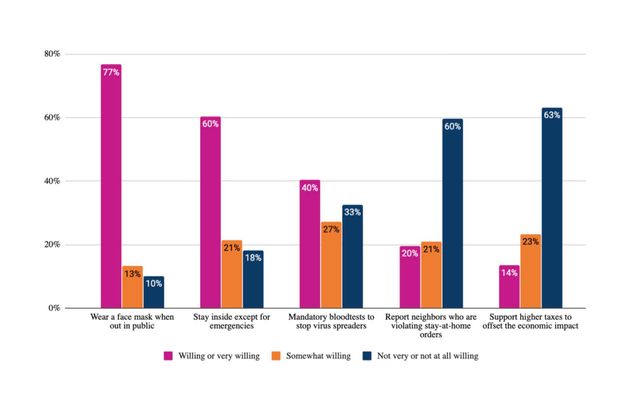
Overall, respondents were quite receptive to lower-effort steps to curbing COVID-19, like wearing a mask and staying inside, barring emergencies. There was much higher resistance to surveillance efforts like reporting others violating stay-at-home orders and individual economic sacrifices like paying higher taxes.
Click to read infographic details.
By a two-to-one margin, Americans hold the Chinese people blameless for the pandemic (49 percent vs. 22 percent), according to the survey, which was directed by James Katz, Feld Professor of Emerging Media at the College of Communication. But the same survey found more than a third of Americans believe China could have prevented the spread of the virus and owes payment reparations to those harmed (33 percent vs. 30 percent).
More respondents than not (45 percent vs. 33 percent) say the term “Chinese virus” is racist, but the term “Wuhan virus” is acceptable (37 percent vs. 33 percent), because “that is where it originated.”
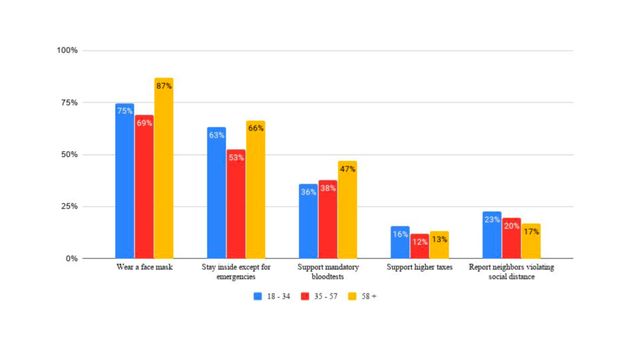
Looking at differences between age groups, the oldest (58+) and youngest (18-34) respondents were most willing to take preventive measures like wearing a face mask and staying inside, as well as supporting higher taxes to offset the economic impact of COVID-19. The oldest group was the most willing to support mandatory blood tests, and most likely to avoid social gatherings with friends and family, cancel or reschedule travel, and stop getting takeout. The youngest group was least likely to avoid social gatherings.

Women were more willing than men to take steps to help curb COVID-19 and more likely to support mandatory blood tests. There was little difference between women’s and men’s willingness to support higher taxes to offset the virus’s economic impact and report neighbors who violate stay-at-home orders—each group expressed low willingness in both cases.
Click to read infographic details.
The survey also suggests continuing broad support for measures urged by many governors, mayors, and medical experts. Three in four Americans say they’re willing to avoid social gatherings, rethink travel, and wear face masks to combat the COVID-19 pandemic, and two-thirds say they’re very willing, willing, or somewhat willing to support “mandatory blood tests to stop virus spreaders” (67 percent vs. 33 percent). However, 6 in 10 say they are unwilling to “report neighbors who violate stay-at-home orders” (59 percent vs. 41 percent).
“Except for some steps, such as raising taxes, the public seems willing to support prolonged or even renewed sacrifices to fight the COVID-19 virus,” says Katz.
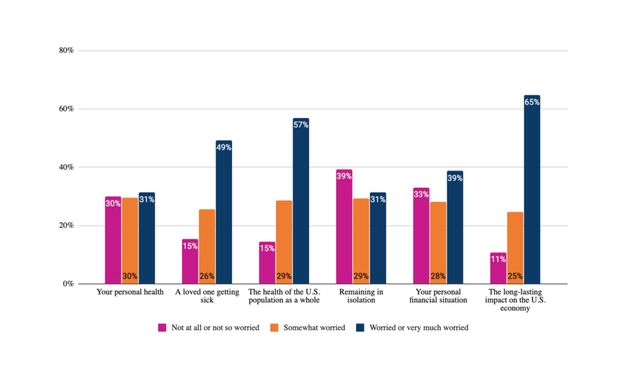
Survey respondents were most worried not about themselves, but about country-level issues: the effect that COVID-19 will have on the US economy and the health of the US population. Nearly half also expressed concern over a loved one getting sick, but only about a third were worried about their personal health.
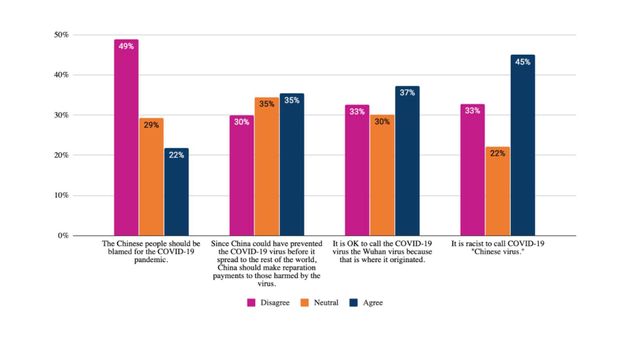
About a third of survey respondents held negative beliefs about China’s role in the virus, though fewer thought that the Chinese people should be blamed for the pandemic.
Click to read infographic details.
The survey also suggested that white respondents are less willing than African American, Latinx, and Asian American respondents to take steps to prevent the spread of the virus. For example, 54 percent of white respondents say they are willing to “stay inside except for emergencies,” in contrast to at least 70 percent of all other ethnic groups.
A similar gap between genders exists, the survey suggested, with men less supportive than women of preventive measures.
Comments & Discussion
Boston University moderates comments to facilitate an informed, substantive, civil conversation. Abusive, profane, self-promotional, misleading, incoherent or off-topic comments will be rejected. Moderators are staffed during regular business hours (EST) and can only accept comments written in English. Statistics or facts must include a citation or a link to the citation.